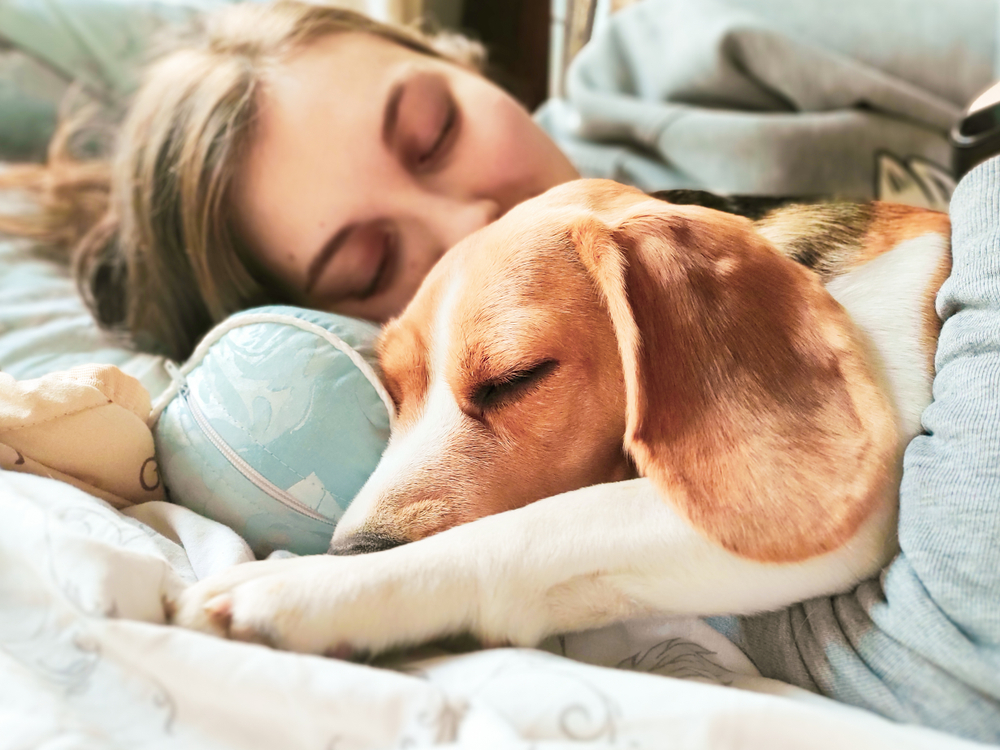Your cart is currently empty!
Man Nearly Loses Arm After Contracting Life-Threatening Infection From Sleeping With His Dog

For many pet owners, letting a dog curl up on the bed is one of life’s greatest comforts. The steady rhythm of a dog’s breathing, the warmth of its body, and the simple reassurance of having a beloved companion close by often make the bedroom feel safer and cozier. It becomes a ritual that strengthens the emotional bond between humans and their pets, offering a sense of calm at the end of a stressful day. Yet for one man, what seemed like a harmless nightly routine turned into a terrifying medical crisis that nearly cost him his arm. After sharing his bed with his dog, he developed an infection so severe and aggressive that doctors had to act quickly to save both his life and his limb.
The man was diagnosed with necrotizing fasciitis, a rare but extremely dangerous bacterial infection that destroys tissue at alarming speed. What began as swelling and pain in his arm rapidly escalated, revealing just how devastating infections of this kind can be. This story is unsettling, but it is also an important reminder: while pets bring immeasurable joy and companionship, they can sometimes carry bacteria or pathogens that put humans at risk, especially if there are hidden vulnerabilities in our immune systems or small, unnoticed breaks in the skin. Rather than encouraging fear of pets, cases like this highlight the need for awareness, balanced choices, and preventive steps to ensure that love for animals and good health can coexist.
The vets response was more or less “we’ll try but go home and get him comfortable and prepare for the worst”.
— Niall Harbison (@NiallHarbison) January 1, 2023
Anyone who can read blood tests will see he was as close to the edge as possible. Blood parasites. Mange and Literally 100s of ticks and fleas pic.twitter.com/70ESierTWa
What Exactly Is Necrotizing Fasciitis?
Necrotizing fasciitis, often described in sensational headlines as a “flesh-eating disease,” lives up to its reputation because of how destructive it can be once it takes hold. The infection is typically caused by aggressive bacteria, such as Streptococcus pyogenes or animal-associated strains like Capnocytophaga. What makes it so dangerous is not just the type of bacteria but the speed at which it spreads. The bacteria release toxins that destroy muscle, fat, and skin tissue, while also traveling through the bloodstream and overwhelming the body. Even the smallest cut or scrape can serve as an entry point, allowing these microbes to bypass the body’s outer defenses.
The early symptoms are deceptively mild. Pain, swelling, and redness at the site of infection can easily be mistaken for something minor like a bug bite, skin irritation, or sprain. In the case of the man who contracted the illness from his dog, the condition worsened within hours, spreading through his arm and threatening to shut down vital systems. Doctors rushed him into emergency treatment, and only quick intervention saved him from losing more than just his arm. This is why necrotizing fasciitis is such a frightening condition. It doesn’t give the luxury of time for second guesses.
Survival rates depend heavily on how quickly the infection is identified and treated. Surgery is often required to remove dead or infected tissue, sometimes leading to amputation to stop the spread. Even survivors frequently live with long-term complications, such as nerve damage, severe scarring, and mobility challenges. By the time most people realize the seriousness of their symptoms, the bacteria may already have advanced far beyond the initial site. This underlines the importance of early recognition and immediate medical care if an unusual or rapidly worsening infection is suspected.

Can Pets Really Pass Dangerous Infections to Humans?
It may sound surprising, but the mouths, skin, and fur of otherwise healthy dogs and cats can harbor bacteria that cause severe infections in humans. One of the most notable examples is Capnocytophaga canimorsus, which lives in the saliva of many healthy dogs and cats without causing them any harm. In people, however, it can lead to severe illness, particularly when introduced into the bloodstream through bites, scratches, or close contact with broken skin. While such infections are rare, when they occur, they can become very serious very quickly.
Those at highest risk include people with weakened immune systems, diabetes, liver disease, or chronic health conditions. For them, even what appears to be a harmless lick on a small cut could introduce bacteria with dangerous consequences. This doesn’t mean every interaction with pets is unsafe. Millions of people live long, healthy lives with their animals without ever facing a health crisis. But the risks increase when certain conditions align, such as poor wound care, a vulnerable immune system, or close contact that exposes skin to bacteria-laden saliva.
Experts stress that the risk can be reduced dramatically through simple measures. Regular veterinary visits keep pets healthy and free from many parasites and infections. Keeping vaccinations up to date, maintaining good dental hygiene for pets, and ensuring they are on preventive treatments for fleas, ticks, and worms also reduces the microbial load they may carry. The combination of pet wellness and human hygiene creates a protective barrier, ensuring companionship doesn’t come at the cost of health.

How to Sleep Safely With Your Pets
The idea of keeping pets out of the bedroom altogether can feel harsh for those who find comfort in having them nearby. The good news is that there are ways to enjoy the closeness while lowering the risks. First and foremost, ensure that your pets are in good health. Schedule regular veterinary checkups, keep up with deworming and flea control, and feed them a balanced diet that supports their immune systems as much as your own. A healthy pet is far less likely to transmit bacteria that could make you sick.
Human hygiene matters just as much. Washing your hands after handling pets, before eating, and after cleaning up their waste is a simple but powerful defense. If you let your pet sleep in your bed, it’s wise to discourage behaviors like licking your face or sleeping directly on your pillow. These small adjustments reduce the risk of bacterial exposure without requiring you to give up the companionship you cherish.
Cleanliness in the bedroom also matters. Washing bed linens regularly, vacuuming pet hair, and maintaining good ventilation reduce the buildup of allergens and microbes. For people with compromised immune systems or open wounds, the safest option might be keeping pets in a separate bed within the same room. This compromise maintains closeness while creating a healthier boundary that lowers the risk of direct bacterial transfer. Ultimately, the safest approach depends on your health, your pet’s health, and your comfort with managing potential risks.

Boosting Your Body’s Natural Defenses
No matter how careful you are with hygiene, your immune system is the ultimate line of defense against infections. When strong and balanced, it can often neutralize bacteria before they become a threat. Diet is one of the most effective ways to build this resilience. Whole foods rich in vitamins, minerals, and antioxidants provide the nutrients your immune system relies on. Fresh fruits, leafy greens, nuts, seeds, and legumes help keep the body fortified. Vitamin C from citrus, vitamin D from sunlight or fortified foods, and zinc from nuts and beans are particularly beneficial.
Gut health plays an equally important role. Around 70% of the immune system is connected to the gut, and a healthy microbiome supports a balanced immune response. Probiotic-rich foods such as yogurt, kefir, sauerkraut, and kimchi can improve the diversity and strength of beneficial gut bacteria, indirectly enhancing your defenses against infections. Supporting your gut means supporting your entire immune system, which can make a real difference when exposed to harmful bacteria.
Lifestyle habits are just as critical. Sleep deprivation, chronic stress, and inactivity all weaken immune function, leaving the body more vulnerable. Consistent routines that include seven to nine hours of sleep per night, regular physical activity, and mindfulness practices like meditation or yoga can regulate stress hormones and help keep the immune system strong. For those interested in natural remedies, herbs such as echinacea, elderberry, and astragalus are often used in traditional medicine to support immune health. While these should never replace medical treatment, they may serve as useful complements for overall wellness.

Prevention Is the Best Medicine
The story of a man nearly losing his arm after sleeping with his dog may sound alarming, but it shouldn’t be taken as a reason to avoid pets altogether. The truth is, pets provide immense emotional and physical benefits, from reducing stress and anxiety to encouraging exercise and boosting mood. Instead of seeing pets as health risks, it’s more helpful to see them as partners in a lifestyle that requires mindfulness and care. Prevention, in this case, is about creating a healthier environment for both you and your animals.
Think of every interaction with a pet as an exchange of microbes. Most of the time, these exchanges are harmless or even beneficial, exposing us to bacteria that train our immune systems to respond more effectively. Problems arise only under specific conditions, such as when harmful bacteria meet an open wound or a vulnerable immune system. By focusing on the factors you can control, like hygiene, pet care, and immune strength, you significantly reduce the likelihood of dangerous infections.
Balancing affection with caution doesn’t mean sacrificing closeness. It means creating habits that protect your health while allowing the deep, rewarding relationship with your pet to thrive. By practicing awareness, you ensure that moments of comfort and companionship don’t turn into unexpected health emergencies.
Loving Your Pet Without Losing Your Health
The case of a man almost losing his arm after sharing his bed with his dog is dramatic, but it also carries a valuable message: awareness and prevention matter. Pets enrich our lives in countless ways, but it’s important to remember that they are living beings with their own ecosystems of bacteria and microbes. With simple precautions, you can enjoy their companionship without putting yourself at unnecessary risk.
This is about mindfulness, not fear. By combining proper pet care, smart hygiene habits, and a lifestyle that supports strong immunity, you can embrace the joy of having your pet by your side without losing peace of mind. Love and health don’t have to compete; with the right balance, they can complement one another beautifully.
